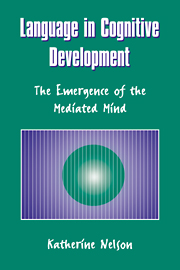Book contents
- Frontmatter
- Contents
- Preface
- I PERSPECTIVES
- 1 Language, Cognition, and Culture in Developmental Perspective
- 2 Emergence of Human Minds in Evolution and Development
- 3 Evolution and Development of the Hybrid Mind
- II DEVELOPING REPRESENTATIONAL SYSTEMS
- III DEVELOPING CONCEPTUAL SYSTEMS
- IV CONCLUSIONS
- Notes
- References
- Name Index
- Subject Index
3 - Evolution and Development of the Hybrid Mind
Published online by Cambridge University Press: 05 June 2012
- Frontmatter
- Contents
- Preface
- I PERSPECTIVES
- 1 Language, Cognition, and Culture in Developmental Perspective
- 2 Emergence of Human Minds in Evolution and Development
- 3 Evolution and Development of the Hybrid Mind
- II DEVELOPING REPRESENTATIONAL SYSTEMS
- III DEVELOPING CONCEPTUAL SYSTEMS
- IV CONCLUSIONS
- Notes
- References
- Name Index
- Subject Index
Summary
In contrast to the evolutionary perspectives found in Chapter 2, which focused on general processes and levels of intelligence and knowing, and on the specific domain of language, Merlin Donald's (1991) proposal for the evolution of the modern mind provides a detailed model of representational stages in evolution that provoke developmental analogies. In this chapter that model and its developmental implications are considered in some detail. The purpose of using this model of the evolution of human cognition for a developmental analysis is to provide an integrated conceptualization of the biological in human cognitive development that coheres with (and does not compete with) the cultural. Donald's scheme is an attempt to do this on the phylogenetic scale. As forecast in the previous chapter, the biology of the human individual is seen as potentiating the cultural achievements of the group, thereby making possible the more complex cognitive achievements of individuals within the group. There is no possibility of divorcing biology from culture in this scheme. Similarly, there is no possibility of divorcing the mind from the body, or ideation from activity.
Donald's Theory of the Evolution of Human Cognition and Language
The goal of Donald's (1991) original theory of the phylogenetic evolution of human cognition is to find a satisfactory solution to the problem of how human cognition evolved over a brief period of time (speaking paleontologically) from a basic general primate structure to the far more complex and differentiated – and thus powerful – human kind.
Information
- Type
- Chapter
- Information
- Language in Cognitive DevelopmentThe Emergence of the Mediated Mind, pp. 59 - 88Publisher: Cambridge University PressPrint publication year: 1996
